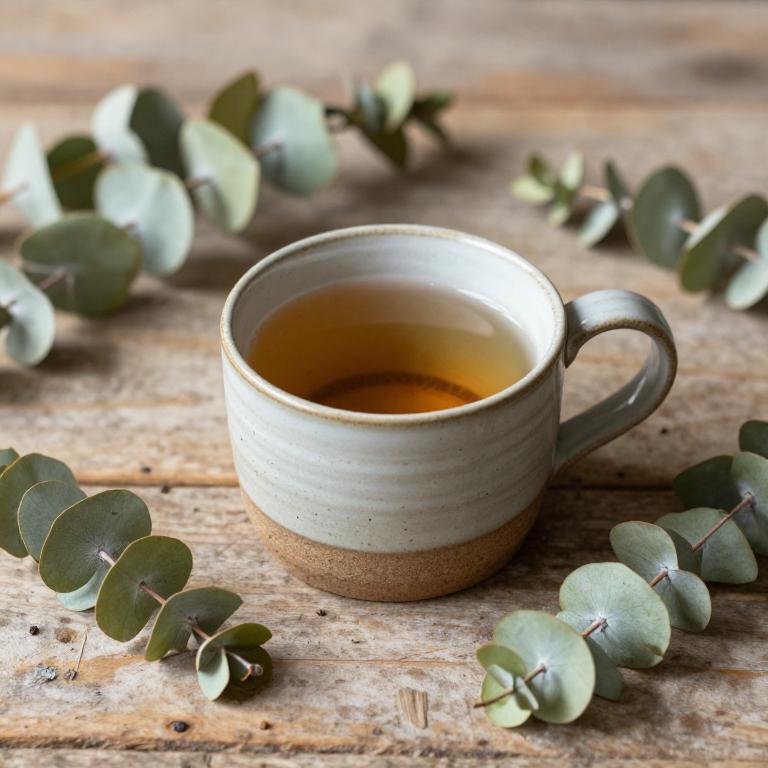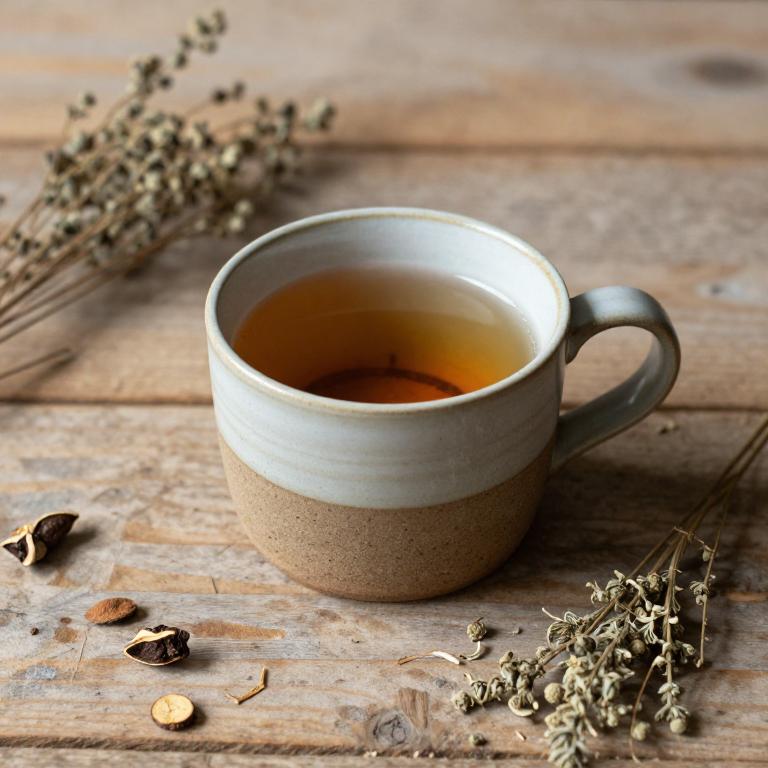10 Best Herbal Teas For Dry Nose

Herbal teas can be a natural and soothing remedy for a dry nose, offering gentle hydration and relief from irritation.
Ingredients like chamomile, licorice root, and eucalyptus are commonly used in herbal teas due to their anti-inflammatory and moisturizing properties. These teas work by thinning mucus and reducing inflammation in the nasal passages, making breathing more comfortable. To use them effectively, it's best to drink warm herbal tea several times a day, allowing the steam to help moisturize the nasal lining.
However, it's important to consult with a healthcare provider if symptoms persist or worsen, as persistent nasal dryness may indicate an underlying condition.
Table of Contents
- 1. Salvia (Salvia officinalis)
- 2. Stinging nettle (Urtica dioica)
- 3. Rosemary (Rosmarinus officinalis)
- 4. Camellia (Camellia sinensis)
- 5. Ginger (Zingiber officinale)
- 6. Eucalyptus (Eucalyptus globulus)
- 7. Peppermint (Mentha piperita)
- 8. Thyme (Thymus vulgaris)
- 9. Fennel (Foeniculum vulgare)
- 10. Ceylon cinnamon (Cinnamomum verum)
1. Salvia (Salvia officinalis)

Salvia officinalis, commonly known as sage, is a traditional herbal remedy that has been used for centuries to address various health concerns, including respiratory issues.
Sage herbal tea is particularly beneficial for individuals experiencing a dry nose, as it contains compounds that may help soothe and moisturize the nasal passages. The tea's anti-inflammatory and antimicrobial properties can reduce irritation and infection, promoting healthier nasal tissue. When brewed and consumed regularly, sage tea may help alleviate dryness and improve overall nasal comfort.
However, it is advisable to consult a healthcare professional before using sage tea, especially for those with existing health conditions or who are pregnant.
2. Stinging nettle (Urtica dioica)

Urtica dioica, commonly known as stinging nettle, is a herb that has been traditionally used for its various health benefits, including its potential to alleviate symptoms of a dry nose.
When prepared as a herbal tea, stinging nettle can help moisturize and soothe the nasal passages due to its high content of minerals and antioxidants. The tea is believed to reduce inflammation and irritation, making it a natural remedy for dryness and discomfort in the nose. It is often recommended as a gentle alternative to over-the-counter nasal sprays or decongestants.
However, individuals with allergies or sensitivities should consult a healthcare professional before using stinging nettle tea to ensure it is safe for their specific condition.
3. Rosemary (Rosmarinus officinalis)

Rosmarinus officinalis, commonly known as rosemary, is a fragrant herb often used in herbal teas to support respiratory health.
When brewed into a tea, rosemary can help soothe a dry nose by promoting circulation and reducing inflammation in the nasal passages. Its essential oils, such as cineole and camphor, have natural decongestant properties that may help alleviate nasal congestion and dryness. Drinking rosemary tea regularly can also provide a calming effect and support overall immune function.
However, it is advisable to consult with a healthcare professional before using rosemary tea, especially for individuals with known allergies or medical conditions.
4. Camellia (Camellia sinensis)

Camellia sinensis, the plant from which green, black, and white teas are derived, is also used to make herbal teas that may help alleviate symptoms of a dry nose.
These teas contain antioxidants and anti-inflammatory compounds that can soothe irritated nasal passages and improve overall respiratory health. Drinking warm Camellia sinensis herbal tea can help moisten the airways and reduce the discomfort associated with a dry nose. Additionally, the mild warming effect of the tea may promote better blood circulation in the nasal area.
While not a cure for dryness, regular consumption of these herbal teas can be a natural and soothing complement to nasal care routines.
5. Ginger (Zingiber officinale)

Zingiber officinale, commonly known as ginger, is a popular herbal ingredient used in teas to address various health concerns, including a dry nose.
The warming properties of ginger can help stimulate blood circulation and increase mucous membrane hydration, which may alleviate dryness in the nasal passages. When brewed into a tea, ginger provides a soothing and aromatic experience that can offer relief from nasal dryness caused by environmental factors or seasonal changes. To prepare ginger tea for a dry nose, fresh or dried ginger root is typically sliced and steeped in hot water for several minutes.
Regular consumption of ginger tea may support overall respiratory health and provide a natural remedy for persistent nasal dryness.
6. Eucalyptus (Eucalyptus globulus)

Eucalyptus globulus, commonly known as Australian eucalyptus, is a popular ingredient in herbal teas due to its potent medicinal properties.
These teas are often used to alleviate symptoms of a dry nose by promoting nasal moisture and reducing congestion. The essential oils in eucalyptus globulus contain compounds like eucalyptol, which have anti-inflammatory and decongestant effects. Drinking eucalyptus globulus herbal tea can help soothe irritation and improve breathing in individuals with dry or irritated nasal passages.
However, it is important to consult a healthcare provider before using these teas, especially for those with allergies or underlying health conditions.
7. Peppermint (Mentha piperita)

Mentha piperita, commonly known as peppermint, is a popular herb used in herbal teas to alleviate symptoms of a dry nose.
The cooling and aromatic properties of peppermint help to soothe irritation and reduce nasal congestion, making it particularly beneficial for those experiencing dryness or chronic sinus issues. Peppermint tea can stimulate mucus production, which helps to moisten the nasal passages and provide relief from dryness. It also has anti-inflammatory and antimicrobial properties that support overall nasal health.
Regular consumption of peppermint herbal tea may offer a natural and effective remedy for managing a dry nose, especially when combined with proper hydration and environmental adjustments.
8. Thyme (Thymus vulgaris)

Thymus vulgaris, commonly known as thyme, is a popular herb used in herbal teas to address various health concerns, including a dry nose.
The essential oils in thyme, particularly thymol, have antimicrobial and anti-inflammatory properties that can help soothe nasal passages and reduce irritation. When brewed into a warm herbal tea, thyme can provide a comforting, aromatic steam that may help moisturize the nasal lining and ease breathing. It is often combined with other soothing herbs like ginger or eucalyptus to enhance its effects.
However, individuals with allergies or sensitive nasal conditions should use thyme cautiously and consult a healthcare professional before regular use.
9. Fennel (Foeniculum vulgare)

Foeniculum vulgare, commonly known as fennel, is a versatile herb often used in herbal teas to address various health concerns, including dry nose.
The essential oils in fennel, particularly anethol, have mild warming properties that can help soothe and moisten the nasal passages. When brewed into a tea, fennel can provide a gentle, aromatic warmth that may alleviate dryness and irritation in the nose. It is often recommended for individuals experiencing dryness due to environmental factors or seasonal changes.
However, it is important to consult a healthcare professional before using fennel tea, especially for those with allergies or underlying health conditions.
10. Ceylon cinnamon (Cinnamomum verum)

Cinnamomum verum, commonly known as true cinnamon, is often used in herbal teas to soothe and moisturize a dry nose.
The aromatic compounds in cinnamon have mild warming properties that can help improve nasal circulation and reduce congestion. When brewed as a tea, it can provide a comforting, spicy scent that may help ease the discomfort of a dry or irritated nasal passage. Some people find that inhaling the steam from cinnamon tea can offer additional relief by hydrating the nasal membranes.
However, it is important to use cinnamon in moderation, as excessive consumption may cause irritation or allergic reactions in some individuals.